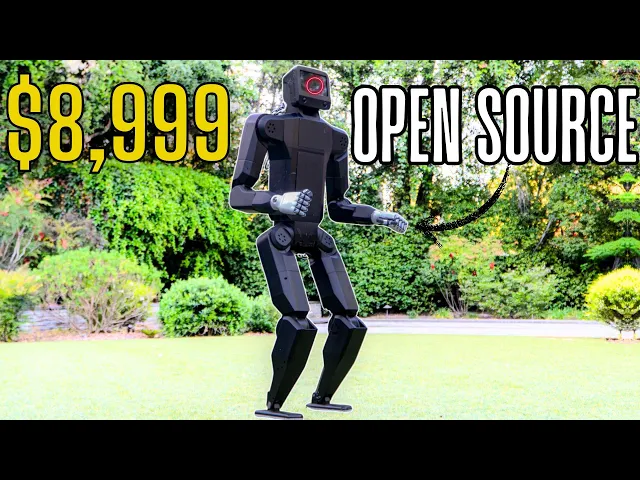NEW $8,999 Open Source K-Scale Humanoid Robot & AI Roadmap 2025-2028 (CL-3 UPDATE)

Rise of the open source humanoid robot
In the rapidly evolving landscape of robotics, a remarkable new contender has emerged. Unitree, known for their robotic dog platforms, has unveiled an $8,999 open source humanoid robot that promises to democratize access to advanced robotics technology. The announcement represents a potential inflection point for the industry, where previously prohibitive costs have limited serious development to well-funded corporations and research institutions. Now, the barriers to entry are crumbling as accessible hardware meets the open source philosophy.
Key developments from the video
- Unitree has launched an affordable humanoid robot priced at $8,999, significantly undercutting competitors in the market while offering impressive technical specifications including a 5kg payload capacity
- The robot leverages an open source approach with ROS (Robot Operating System) integration, enabling developers to build upon existing work rather than starting from scratch
- The presenter outlines an ambitious AI roadmap spanning 2025-2028, highlighting rapid acceleration in capabilities from early commercial deployment to potentially transformative societal impact
The democratization effect
The most compelling insight from this development isn't just the robot's affordability—it's the transformative potential of combining accessible hardware with open source principles. This represents a fundamental shift in how robotics innovation happens.
Historically, robotics development has followed a closed, proprietary model where companies like Boston Dynamics invest hundreds of millions in R&D before producing highly specialized, expensive platforms. This approach creates impressive demonstrations but limits real-world deployment and practical application development. By contrast, the open source model that transformed software development has been difficult to apply to robotics because of hardware costs and complexity.
What makes Unitree's approach revolutionary is that it removes both barriers simultaneously. The $8,999 price point puts advanced humanoid robotics within reach of small businesses, educational institutions, and even dedicated hobbyists. Meanwhile, the open source software stack means developers can build on each other's work, accelerating the pace of innovation exponentially.
Beyond the announcement: market implications
What the video doesn't fully explore is how this democratization might reshape the competitive landscape. Tesla and Boston Dynamics have invested enormous resources in proprietary humanoid robot development, but history suggests proprietary ecosystems often struggle against open alternatives that reach critical mass.
Consider the parallel with computing:
Recent Videos
How To Earn MONEY With Images (No Bullsh*t)
Smart earnings from your image collection In today's digital economy, passive income streams have become increasingly accessible to creators with various skill sets. A recent YouTube video cuts through the hype to explore legitimate ways photographers, designers, and even casual smartphone users can monetize their image collections. The strategies outlined don't rely on unrealistic promises or complicated schemes—instead, they focus on established marketplaces with proven revenue potential for image creators. Key Points Stock photography platforms like Shutterstock, Adobe Stock, and Getty Images remain viable income sources when you understand their specific requirements and optimize your submissions accordingly. Specialized marketplaces focusing...
Oct 3, 2025New SHAPE SHIFTING AI Robot Is Freaking People Out
Liquid robots will change everything In the quiet labs of Carnegie Mellon University, scientists have created something that feels plucked from science fiction—a magnetic slime robot that can transform between liquid and solid states, slipping through tight spaces before reassembling on the other side. This technology, showcased in a recent YouTube video, represents a significant leap beyond traditional robotics into a realm where machines mimic not just animal movements, but their fundamental physical properties. While the internet might be buzzing with dystopian concerns about "shape-shifting terminators," the reality offers far more promising applications that could revolutionize medicine, rescue operations, and...
Oct 3, 2025How To Do Homeless AI Tiktok Trend (Tiktok Homeless AI Tutorial)
AI homeless trend raises ethical concerns In an era where social media trends evolve faster than we can comprehend them, TikTok's "homeless AI" trend has sparked both creative engagement and serious ethical questions. The trend, which involves using AI to transform ordinary photos into images depicting homelessness, has rapidly gained traction across the platform, with creators eagerly jumping on board to showcase their digital transformations. While the technical process is relatively straightforward, the implications of digitally "becoming homeless" for entertainment deserve careful consideration. The video tutorial provides a step-by-step guide on creating these AI-generated images, explaining how users can transform...
